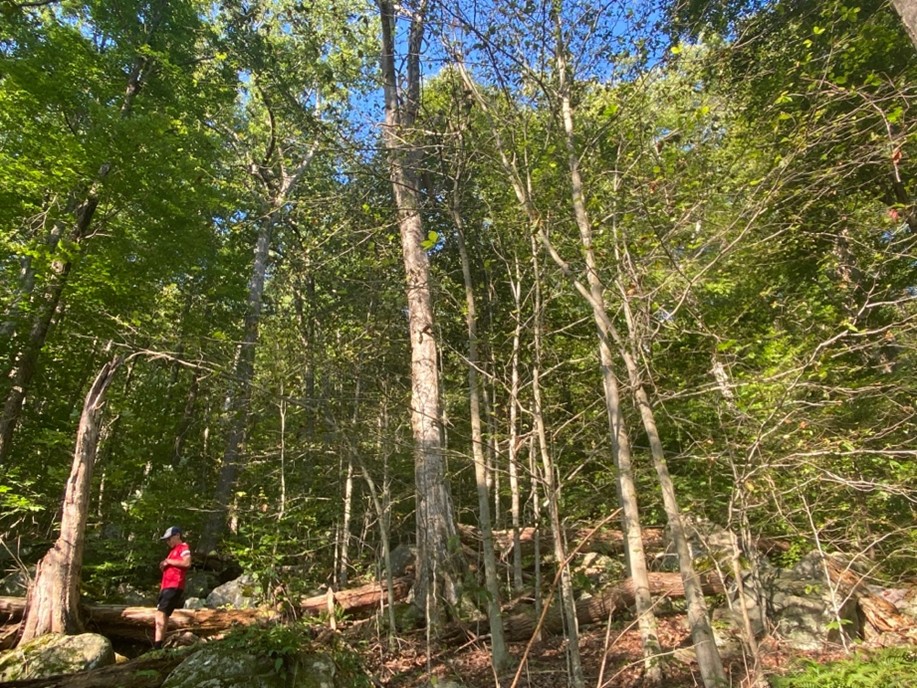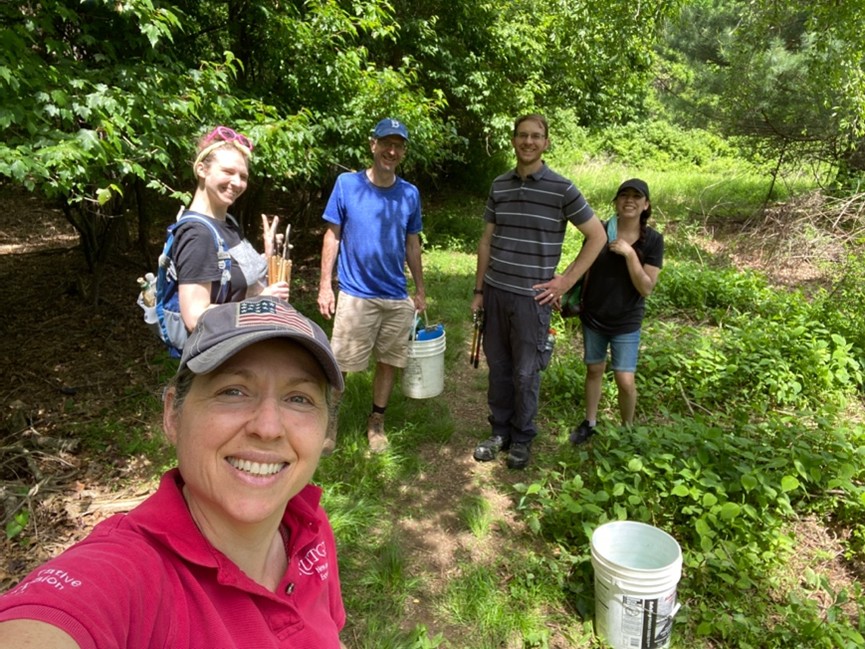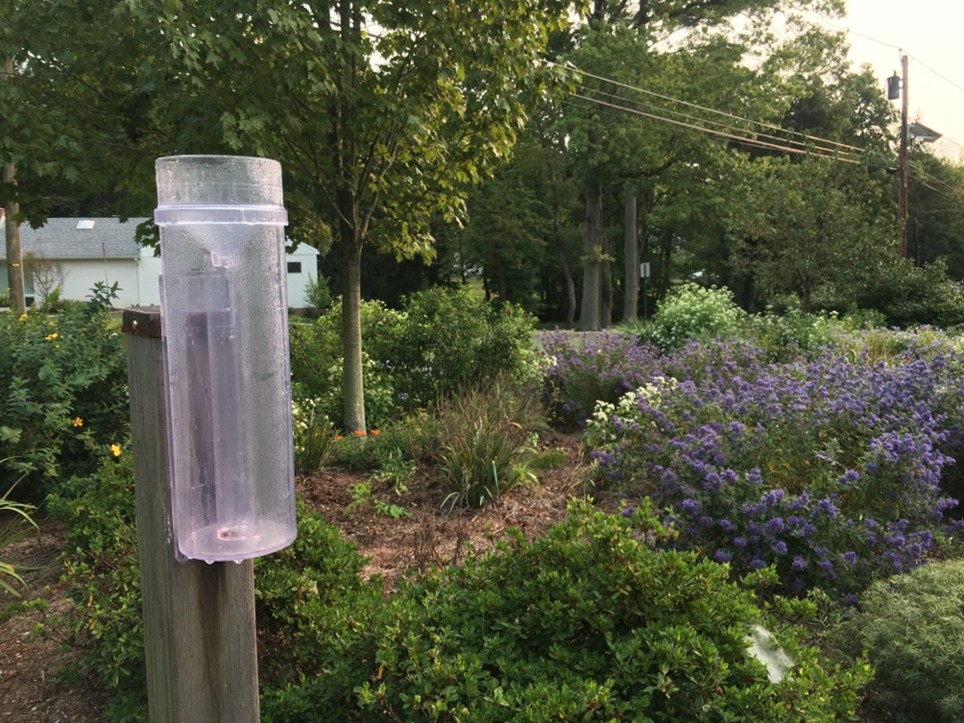Main Content
By Michele Bakacs (Associate Professor/ County Agent)
I spent the past year watching as beech leaf disease ravaged through some of my favorite forests in New Jersey. Seeing these majestic beech trees suddenly dying around me, has brought me sorrow in a way that I have never felt before about the natural world.
I go to the woods to escape and heal. It is my happy place and my workplace. Now my workplace brings me grief and as it turns out this grief has a name. “Ecological grief” (or “eco-grief”), is a feeling of sorrow or loss that results from environmental change or the loss of ecosystems, species, or landscapes. This mental health condition has received much research and press, the condition being reported by both natural resource professionals like me, the volunteer community, and the public.

Figure 1. A stand of beech trees impacted by beech leaf disease.
There are several terms being used to describe the feelings associated with watching environmental changes happening around us, including “eco-grief”, “climate anxiety,” and “solastalgia”. An American Psychological Association survey released in February 2020 found that among the 2,017 people surveyed, more than two-thirds (68%) of the adults said they had “at least a little ‘eco-anxiety,’” or anxiety or worry about climate change and its effects. Nearly half (48%) of young adults (18 to 34) said they felt stress over climate change in their daily lives.
Key causes of eco-grief
My eco-grief, relating to the decline of a species, is just one of many factors researchers say are causing people to mourn changes we see in the natural world. Some others include:
- Direct loss by witnessing the disappearance of a familiar landscape or species, for example a migratory bird or butterfly that returns to your area each season.
- The adjustment experienced after an extreme weather event, for example a hurricane or wildfire.
- Slow, gradual changes in an environment for which you have strong ties, such as the sense of loss felt by a lake that used to freeze regularly in the winter.
- The loss of cultural identity, for example an indigenous community mourning the loss of hunting and fishing grounds.
- Anticipating future loss felt by youth worrying about the fate of the planet and how it will affect them as they learn about the impacts of climate change.
- Feeling that there is nothing you can do, and these environmental changes are out of your control.
I hear these feeling echoed by the public where I work in central New Jersey. Residents recount stories of streams that used to be local watering holes for swimming, but now run dry in the summer. Popular birding spots now overrun with invasive plants that don’t support migratory species. And the frustration felt by more frequent flooding damaging homes and property.
Talking your way out of eco-grief
Mental health professionals agree that the first step is talking about your grief and anxieties in supportive communities. Everyone’s needs and comfort levels for discussing grief and anxiety differ. The organization Climate Generation has a resource list for those experiencing climate grief, including support groups, articles, books, podcasts, and videos. The Climate Mental Health Network has resources for youth, parents, and educators.
There are many articles impressing on the health care community that it is critical for professionals to take eco-grief and mental health issues surrounding climate change seriously. For example, a December 2024 editorial in the Association of American Medical Colleges noted “Given the growing distress, current and future physicians have an ethical obligation to expand their knowledge of climate anxiety and how best to help patients struggling with it.” In 2023, the American Psychiatric Association released its position statement noting that “Research funding on the impacts of climate change on mental health, utilization of mental health services, and the development of cost-effective supportive interventions is essential.”
In addition to healthcare, supportive communities need to include the organizations that employ natural resource professionals and the community scientists that volunteer. Those working and volunteering in the natural resource field are at the front lines of declining ecosystems. While those of us in these roles are supposed to be unbiased observers and reporters of environmental change, it is difficult not to feel loss. We are often in the position of not only having to deal with our own emotions about the issue, but also having to explain and comfort others, while being expected to come up with viable solutions. A May 2024 article in Conservation Letters, A Journal of the Society for Conservation Biology noted “Addressing the effects of experiencing environmental loss, including ecological grief, is therefore urgent for individuals, managers, and supervisors, and critically, a responsibility for senior leadership in organizations where environmental professionals work”.
Action is the best medicine
In addition to talking, individuals need to be doing. This means taking steps to improve an environmental condition. When deciding where to start, think about what you value, what you are passionate about, and what is within your ability to accomplish.
For example, for my concerns surrounding beech leaf disease, as a County Agent I am in a direct position to educate local townships and land managers on recommended practices for the responsible environmental stewardship of their forests. My co-worker, Jean Epiphan, has developed excellent technical assistance resources for communities to inventory and save their native forest seedlings. Based on her work, I now teach stakeholders about tree seedling assessments so they can proactively protect our future forests. Knowing I am helping with this issue, however small, makes me feel better.

Figure 2. Volunteers with the Watchung Reservation Invasive Plant Strike Team.
When taking on your own eco-grief, start with your own home or your community. Research local organizations taking on issues of importance to you.
- Invasive species got you down? The NJ Invasive Species Strike Team has volunteer groups all over the state that need your help. Managing invasive plants will get you into nature, help learn new plant ID skills, and work with other likeminded people that may just be the supportive community you’ve been looking for to discuss your eco-grief. Channel your anxiety into productivity by cutting down invasive vines, trees, and shrubs.
- Lamenting ecological changes? Turn your observations into science by joining a community science project. From tracking monarch butterflies to monitoring rainfall right in your backyard, join a data collection project that contributes to our understanding of the changing world around us. The more we know, the more resilient we can be in our planning for ecological change. Visit the SciStarter science hub website which bring together millions of curious and concerned people in the world and search for a project that inspires you. For example, watershed associations across the state need volunteers to help them track changes to our rivers and streams. Shameless plug alert: At Earth Day, Every Day we are inspired by CoCoRaHS, the Community Collaborative, Rain, Hail, and Snow Network.

Figure 3. A CoCoRaHS rain gauge used by community scientists to watch and report weather conditions.
- Looking to make changes in your own home? Rutgers provides excellent resources on the New Jersey Climate Change Resource Center including how to reduce your greenhouse gas emissions. The actions are broken down into what can be done at home, on your plate, on the go, and in your community. Choose a few achievable actions for 2025 and make a game plan with your household on how you will achieve them with realistic timelines and deadlines. Some of these items can be done right away, for example tackling food waste in your home, changing out light bulbs to LEDs, and planning for plant-based meals to reduce meat consumption. Looking for other climate actions? Check out Project Drawdown’s table of solutions.
| If you know of a mental health support group, organization, or resources focused on eco-grief , climate change anxiety, or solastalgia please email the editors. |
Faced with seemingly constant negative news about the environment, it can be difficult to have hope. You could argue that these actions are too small, not impactful enough. But small steps strung together can lead to big impact.
So, make sure that you grieve. It is an important part of the healing process. But don’t let eco-grief debilitate you into inaction. Let 2025 be the year you turn eco-grief into eco-health.
References and further reading on this topic:
Attanasio R. (2020) The Dispassionate Observer and the Grieving Environmental Scientist. Integrated environmental assessment and management.16(2):164-165. setac.onlinelibrary.wiley.com/doi/10.1002/ieam.4241
Cooke, A., Benham, C., Butt, N., & Dean, J. (2024). Ecological grief literacy: Approaches for responding to environmental loss. Conservation Letters, 17, e13018. doi.org/10.1111/conl.13018
Cunsolo, A., Ellis, N.R. (2018). Ecological grief as a mental health response to climate change-related loss. Nature Clim Change. 8, 275–281. doi.org/10.1038/s41558-018-0092-2
Fraser, J., Victor Pantesco, Karen Plemons, Rupanwita Gupta and Shelley J. Rank (2013) Sustaining the Conservationist. Ecopsychology. 5 (2) 70-79. doi.org/10.1089/eco.2012.0076
Galway LP, et al. (2019) Mapping the Solastalgia Literature: A Scoping Review Study. Int J Environ Res Public Health. 16(15):2662. www.mdpi.com/1660-4601/16/15/2662
Ursano, Robert J. (2023, March) Position Statement on Climate Change and Mental Health. American Psychiatric Association. www.psychiatry.org/patients-families/climate-change-and-mental-health-connections
Wray, B. and Hundal, H. (2024, Dec. 3). The Growing Toll of Climate Anxiety. Association of American Medical Colleges. www.aamc.org/news/growing-toll-climate-anxiety